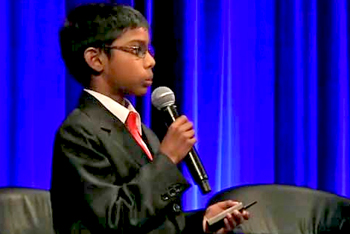 New Delhi, Nov 13: An eight-year old Indian-origin child prodigy is among experts who will address a cyber security conference starting Thursday, where Minister of State for External Affairs V K Singh is also listed as a keynote speaker.
New Delhi, Nov 13: An eight-year old Indian-origin child prodigy is among experts who will address a cyber security conference starting Thursday, where Minister of State for External Affairs V K Singh is also listed as a keynote speaker.
In his address at the summit on November 14, the US-based whizkid Reuben Paul will highlight and demonstrate the need for developing the current generation with cyber security skills, according to the organisers of Ground Zero Summit to be held in New Delhi.
The organisers said, "8 year old Reuben Paul gives keynote at Houston Security Conference."
"I started learning about computer languages around one- and-a-half years back. Now I design my own projects," Reuben said.
The prodigy has been trained by his father, Mano Paul, in Object C programming language and is now learning Swift programming for Apple's iOS platform. Mano Paul, born and raised in Odisha, moved to the US in 2000.
In August Reuben started Prudent Games, his own gaming firm and is designated as CEO of the company. Mano Paul is his partner in the company.
"This will be Reuben's fourth conference where he will be giving lecture on cyber security. He will talk about the need to create awareness about cyber security among young kids as well as demo white page hacking," Mano Paul said.
The other keynote speakers listed for the summit include Home Ministry Joint Secretary Nirmaljeet Singh Kalsi, Special Commissioner Police (Traffic) with Delhi Police Muktesh Chander and National Technical Research Organization Director of Cyber Security Operations Alok Vijayant.





Comments
Add new comment